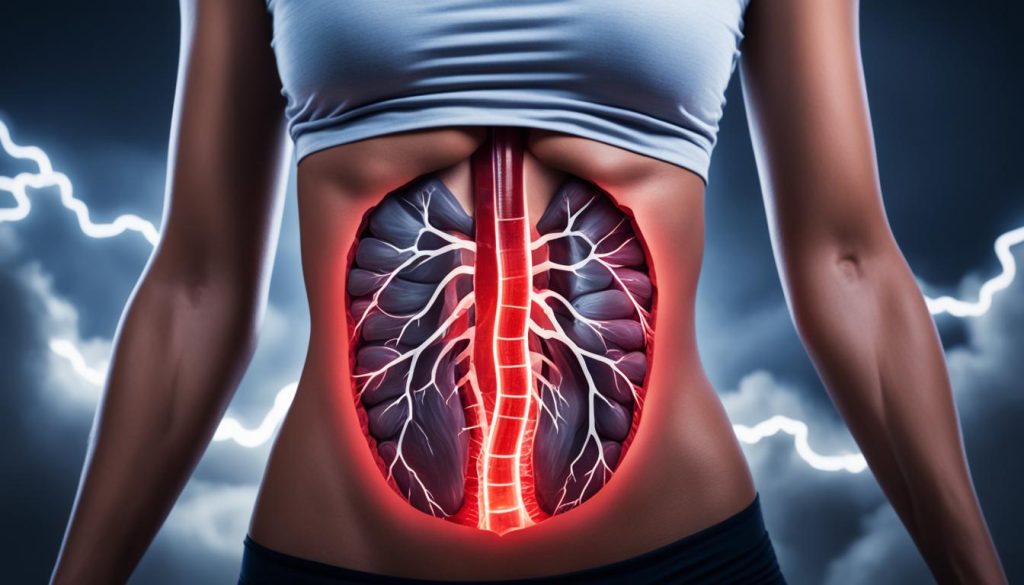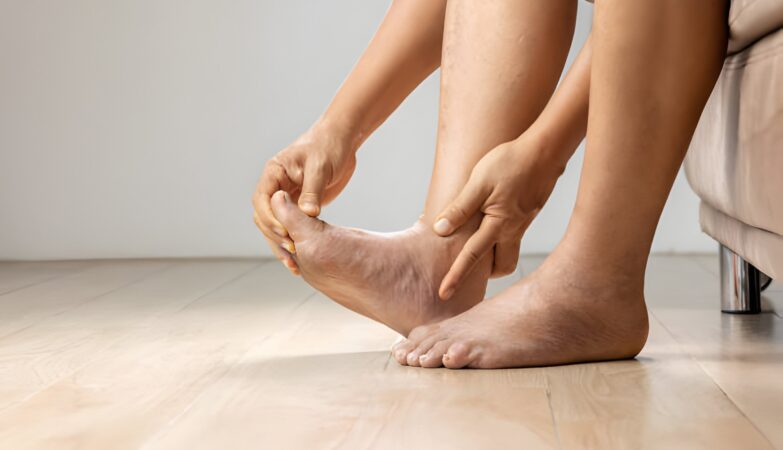Pain during intercourse can be a distressing experience for both partners, affecting not only the physical aspect of your relationship but also the emotional connection you share with your spouse. If your wife experiences sexual discomfort or pain during sex, it is essential to understand her experience, seek proper diagnosis, and explore effective treatment options. By taking the time to educate yourself about the potential causes and addressing the issue together, you can support your wife through this challenging journey and maintain a healthy and fulfilling sexual relationship.
Key Takeaways:
- Approximately one in four women experience pain during intercourse at some point.
- Open communication and support are crucial when discussing sexual pain.
- Consulting with healthcare professionals can help identify the underlying causes.
- Treatment options depend on the specific cause and may include medication, physical therapy, lifestyle changes, and counseling.
- Exploring alternative intimate activities can help maintain a healthy and fulfilling sexual relationship.
Common Causes of Pain During Sex
When it comes to sexual pain in women, understanding the underlying causes is crucial for effective diagnosis and treatment. Here are some common factors that can contribute to pain during sex:
- Vaginal dryness: Insufficient lubrication can cause discomfort and friction during intercourse.
- Muscle spasms: Involuntary contractions of the pelvic floor muscles can make penetration painful.
- Infections: Certain infections, such as yeast infections or urinary tract infections, can lead to discomfort and pain.
- Mood swings: Hormonal changes, particularly during menstruation or menopause, can affect sexual arousal and cause pain.
- Uncomfortable positions: Poor alignment or excessive pressure on sensitive areas can result in pain during intercourse.
Conditions: There are also specific conditions that can cause chronic pain during sex, including:
- Vestibulodynia: A condition characterized by pain and tenderness at the entrance of the vagina.
- Vulvodynia: Chronic vulvar pain that can be experienced during intercourse.
- Vaginismus: Involuntary muscle spasms of the vaginal wall that make penetration difficult or impossible.
- Endometriosis: The presence of uterine tissue outside the uterus, which can cause pain during sex.
- Pelvic inflammatory disease: Infection and inflammation of the reproductive organs that can lead to pain.
Identifying the specific cause of your wife’s sexual pain requires open communication and discussions with a healthcare professional. Understanding the underlying factors can help guide appropriate treatment and management strategies.
Seeking Diagnosis and Treatment
Obtaining a diagnosis for the cause of sexual discomfort and pain in women can be a complex and lengthy process. It is crucial for both you and your spouse to support and listen to each other during this time, fostering an environment of understanding and empathy.
Consulting with specialists such as pelvic floor physical therapists or gynecologists may be necessary to gain a comprehensive understanding of your spouse’s condition.
“Obtaining a diagnosis requires patience and collaboration between partners, healthcare professionals, and specialists. Open communication, documentation of symptoms, and active participation in the diagnostic process can greatly support your spouse’s journey to pain relief and improved sexual health.”
Treatment options for women’s sexual health issues vary depending on the underlying cause. It may involve a combination of medication, physical therapy, surgery, and lifestyle changes. Collaborating with healthcare professionals will ensure a tailored treatment plan to address your spouse’s specific needs effectively.
Diagnostic Process
The diagnostic process often begins with a comprehensive medical history review and a discussion of symptoms. Your spouse’s healthcare professional may conduct physical examinations, laboratory tests, or imaging studies to identify potential causes of sexual pain.
Depending on the situation, additional examinations or consultations with specialists may be recommended to rule out or confirm certain conditions.
Treatment Options
Note: Table to be inserted here
Table: Overview of Common Treatment Options for Sexual Discomfort and Pain
| Treatment Option | Description |
|---|---|
| Medication | Prescribed medications to alleviate pain, address infections, or manage underlying medical conditions. |
| Physical Therapy | Specialized exercises, techniques, and therapies to strengthen pelvic floor muscles, improve vaginal health, and reduce pain. |
| Surgery | Invasive procedures reserved for specific cases, aiming to address anatomical abnormalities or underlying conditions. |
| Lifestyle Changes | Modifications in daily routines, behaviors, and habits to promote overall well-being and minimize discomfort. |
| Counseling | Therapeutic sessions with qualified professionals to address emotional factors, relationship issues, and develop coping strategies. |
Table End
Open and ongoing communication with your spouse and healthcare team is essential throughout the treatment process. Regularly reassessing the effectiveness of the chosen treatment plan will help ensure the best possible outcome.

Coping Strategies for Couples
Pain during sex can have a significant impact on both the emotional and physical intimacy between partners. It is crucial to find coping strategies that allow you to navigate this challenge together and maintain a fulfilling and loving relationship.
One important aspect of coping with sexual discomfort is redefining intimacy. Remember that physical penetration is not the only way to express love and pleasure. Explore alternative ways of connecting and experiencing intimacy that do not involve pain.
Open and honest communication is key in overcoming the challenges of painful sex. Take the time to discuss your needs, desires, and boundaries with your partner. Sharing your thoughts and feelings strengthens the bond between you and helps create a safe and supportive environment.
There are practical steps you can take to minimize discomfort during intercourse. Prioritize ample foreplay to ensure your body is ready and relaxed. Incorporate the use of lubricants to enhance comfort and reduce friction. Experiment with different positions to find the ones that are most comfortable for you and your partner.
Seeking therapy or counseling together can provide additional support in coping with the emotional challenges that arise from sexual pain. A trained professional can help you navigate these difficulties and offer guidance on how to best support each other.
Pain during sex doesn’t have to define your relationship. With open communication, patience, and a willingness to explore alternative methods of intimacy, you and your partner can overcome this challenge and foster a healthy and fulfilling sexual relationship.
| Key Coping Strategies | Benefits |
|---|---|
| Redefine intimacy | Find alternative ways to express love and pleasure without penetration |
| Open and honest communication | Strengthen the bond between partners and create a supportive environment |
| Ample foreplay | Ensure the body is ready and relaxed for intercourse |
| Use of lubricants | Enhance comfort and reduce friction |
| Experiment with different positions | Find positions that minimize discomfort |
| Seek therapy or counseling | Additional support for addressing emotional challenges |
Overcoming Emotional Challenges
Couples who experience sexual discomfort often face emotional challenges that can strain their relationship. Feelings of guilt, frustration, and rejection may arise, leading to decreased intimacy and communication. However, it’s important to approach the situation with empathy, understanding, and patience, supporting each other through this difficult time.
“Communication is key in overcoming emotional challenges related to sexual pain. By openly discussing your feelings and concerns, you can foster a sense of connection and find solutions together.”
Educate yourselves about the condition causing the pain. By understanding the root cause, you can both make informed decisions regarding treatment options and seek appropriate professional help.
Reassuring your partner that sexual intimacy is not the sole basis of your love and finding other ways to show affection and maintain intimacy can help alleviate feelings of pressure and anxiety. Explore non-sexual activities that bring pleasure and emotional connection, such as cuddling, massages, or engaging in shared hobbies.
Remember that seeking support from healthcare professionals or joining support groups can provide invaluable guidance and reassurance. Connecting with others who have experienced similar challenges can remind you that you are not alone in your journey towards improving sexual health.
| Strategies for Overcoming Emotional Challenges | Benefits |
|---|---|
| Open and honest communication | Strengthens emotional bond |
| Reassuring your partner | Reduces feelings of guilt and rejection |
| Educating yourselves about the condition | Empowers both partners in decision-making |
| Engaging in non-sexual activities | Maintains intimacy and emotional connection |
| Seeking professional help and support groups | Provides guidance, reassurance, and a sense of community |
Conclusion
Pain during sex is a common issue that many couples face, and it is crucial to address it with open communication and unwavering support. By understanding the potential causes of sexual pain in women, you can guide your wife towards appropriate diagnosis and treatment options that can improve her sexual health and overall well-being. It is important to remember that intimacy and pleasure can be experienced in various ways, and couples can explore alternative methods that do not involve penetration. Seeking professional help, such as consulting with healthcare professionals or therapists, practicing empathy and patience, and maintaining a strong emotional connection with your spouse are key components in overcoming the challenges posed by sexual pain. Together, through teamwork and a commitment to prioritize your partner’s comfort, you can create a healthier, more fulfilling sexual relationship.
FAQ
Why does it hurt my wife when we make love?
Pain during intercourse is a common issue faced by many women, with approximately one in four experiencing it at some point. There are various reasons why sex can be painful for women, including dryness, allergies, infections, conditions like vestibulodynia or vaginismus, and more serious issues like endometriosis or ovarian cysts.
What causes pain during sex in women?
There are several common causes of pain during sex in women, including vaginal dryness, muscle spasms, infections, mood swings, and uncomfortable positions. Hormonal imbalances, medications, and allergies can also contribute to sexual discomfort. Conditions like vestibulodynia, vulvodynia, vaginismus, endometriosis, and pelvic inflammatory disease can cause chronic pain during intercourse.
How can we seek diagnosis and treatment for sexual pain?
It is important to identify the specific cause of your wife’s pain through open communication and discussions with a healthcare professional. Obtaining a diagnosis for the cause of sexual pain in women can sometimes be a complex and lengthy process. It may be necessary to consult with specialists such as pelvic floor physical therapists or gynecologists. Treatment options vary depending on the underlying cause and may include medication, physical therapy, surgery, or lifestyle changes.
What are some coping strategies for couples dealing with sexual pain?
Pain during sex can put a strain on the emotional and physical intimacy between partners. It is important to redefine intimacy and explore alternative ways to express love and pleasure without penetration. Engaging in open and honest communication about needs, desires, and boundaries can help strengthen the bond between partners. Incorporating ample foreplay, using lubricants, and trying different positions can enhance comfort and reduce pain during intercourse. Seeking therapy or counseling together can provide additional support for addressing the emotional challenges that may arise from sexual pain.
How can couples overcome the emotional challenges of sexual pain?
Couples who experience sexual pain often face emotional challenges, including feelings of guilt, frustration, and rejection. It is important to approach the situation with empathy, understanding, and patience. Reassure your wife that your love is not conditional on sex and find other ways to show affection and intimacy. Educate yourselves about the condition causing the pain and seek support from healthcare professionals or support groups. Engaging in non-sexual activities that bring pleasure and emotional connection can help maintain a strong bond between partners.
How can we improve our sexual relationship despite the challenges of sexual pain?
Pain during sex is a common issue that many couples face, and it is important to address it with open communication and support. Understanding the potential causes of sexual pain in women can help guide appropriate diagnosis and treatment. Couples can explore alternative ways to experience intimacy and pleasure without penetration. Seeking professional help, practicing empathy and patience, and maintaining emotional connection are crucial for overcoming the challenges of sexual pain. Remember that overcoming sexual pain requires teamwork, understanding, and a commitment to prioritizing your partner’s comfort and well-being.







